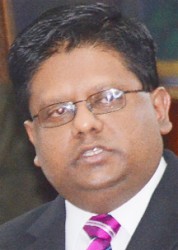Following the warning that government’s proposed spending may face difficulties, Minister of Finance Dr. Ashni Singh has said the administration is committed to consulting the opposition on the national budget and will very soon convene a meeting to consider the submissions of APNU and the AFC.
According to a press release from the Government Information Agency (GINA), Singh stated that while the submissions were received from the parliamentary opposition parties, the recommendations varied in relation to their respective degree of specificity. “In some cases, specific recommendations were made while in other cases vague objectives were outlined and which now require more detailed clarifications,” Minister Singh was quoted as saying.

“That notwithstanding, the opposition submissions have been receiving careful attention from government,” he added.
Last year’s budget was slashed by the opposition after government failed to justify some of the expenditure.
On Monday, the day that the Minister gave his comments, economic point man of main opposition APNU, Carl Greenidge said that up to then there had been no further word from the government on the budget talks.
Opposition parties had submitted their budget proposals towards the end of November 2012.
Greenidge, speaking at a press conference, said that a smooth passage of the national budget was unlikely given government’s continued lack of willingness to meet and seriously consider the opposition’s proposals.
He said that it was “obvious” that the government and the Ministry of Finance in particular were moving to the final stages of preparation of the 2013 national budget and that there has been no effort on the part of government to honour its pledge to have dialogue.
“This breach of faith and lack of consultations will have serious implications for the consideration of the budget proposals and its passage through the National Assembly,” Greenidge warned.
He said that at the last meeting on the budget, the opposition called on the government to report and undertake discussions on the completion of the reform of the tax system; the status of the body set up to look at the burden of taxation, including reduction of VAT; the restoration of viability of the NIS; the minimum wage; raising employment levels in depressed communities and among the young; upgrading the physical environment and infrastructure in communities; revamping the system for selection and sequencing of capital projects and for proper management and implementation of those projects; a review of the Guyana Geology and Mines Commission; and rising debt, among others.




